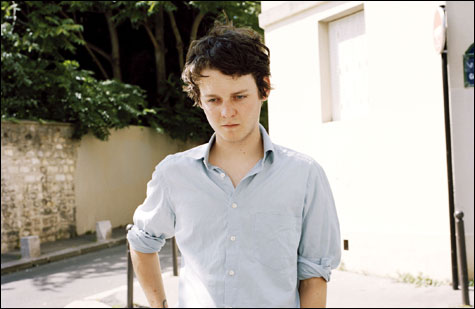
Zach Condon |
| The Flying Cup | by Beirut | released by Ba Da Bing! | October 9 |
Beirut’s role in the Gypsy reappropriation wave is more whimsical than their more aggressive counterparts in Gogol Bordello, in both form and function. The compositions that made up then-19-year-old ringleader Zach Condon’s debut, Gulag Orkestar, were bustling but flimsy; packed with horns and processional rhythms, the album succeeded because every song sounded fresh, if not particularly arched or compact.Gulag remains, though, a stand-out debut of 2006, because if Condon’s youth is apparent in craft, his voice belies any hint of inexperience. The instrument is a diaphragmatic, baritone wail that convincingly renders both vitality and tradition, adding some cultural legitimacy to Gulag’s World Café vibe and redeeming the impressionism that only mars his songs if you’ve the gall to stop soaking up the reverie for a moment.
Auspiciously, Beirut’s follow-up EP, January’s Lon Gisland, began with a brilliant song (“Elephant Gun”) that employs every great idea from Gulag — celebration and mourning as one, mandolin and multi-tracked harmonies, trumpets and more trumpets — in a taut and dynamic six minutes. The release marked the official beginning of Condon’s employment of another fine Balkan-baiting act, A Hack and a Hacksaw, as his backing band, promising greater returns on his new, French-kissed LP, The Flying Club Cup.
The results are complicated, but I’d hesitate to call them mixed. First and foremost, The Flying Club Cup is less immediately satisfying than its predecessors, if only because its Parisian aura requires greater restraint than Gulag’s kitchen-sink rabble-rousing. The keyboard waltz “A Sunday Smile” takes place in a dreamlike sonic bubble similar to the Shins’s early work (or more appropriately, Francis Lai’s classic soundtrack to the 1966 romance Un Homme et Une Femme), and the elements that normally constitute an ostentatious Beirut number (horns, accordion) are quite tame throughout. Condon’s vocals are (even) more pronounced than in previous releases, but his deeper delivery suits these moodier songs well.
Beirut’s Achilles' heel remains song structure, and the problem isn’t when he ends them, but how. They taper off with already-familiar refrains, fade out abruptly, or gradually become sparser. Songs without big choruses, like “Guyamas Sonora” and “La Banlieue,” end with delicate refrains of themes that were never fitfully established. Back to back, the tracks kill the album’s momentum, but a stretch that follows is some of the band’s richest material.
“Cliquot” is a darkly romantic double-accordion waltz highlighting the album’s inventive use of ratatat military drums and layered vocals (joined here by Condon’s Quebecois doppelganger, Arcade Fire/Final Fantasy violinist/producer Owen Pallett, who recorded some of the album). “The Penalty”’s lonely ukulele recalls the biographical intimacy of Beirut’s debut single, “Postcards From Italy,” but for the first time the band manage to sustain tension without grandly releasing it.
The Flying Club Cup is an important step sideways for Zach Condon. It establishes his style as something formulaic but mutable; the album’s elements may be little more than changes in ratio from Gulag Orkestar, but the fresh atmosphere suggests that his is a recipe that can persist. If Condon can refine his quixotic impulses, it might even thrive.
On the Web
Ba Da Bing!:www.badabingrecords.com
Email the author
Christopher Gray: cgray[a]phx.com